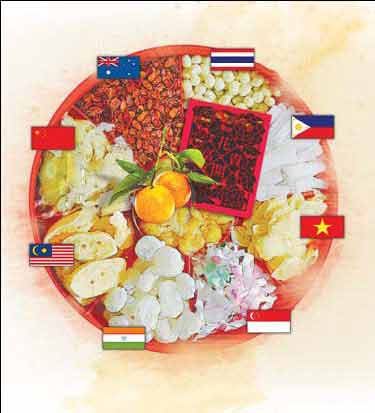Welcoming the rabbit
Our far-flung writers show how the New Year is celebrated in Australia, India, Malaysia, Australia, Philippines, Singapore, Thailand, Vietnam.
|
 |
Australia
Rabbit hops in with a bang Down Under
By Karl Wilson
The Year of the Rabbit will be welcomed in Australia with a bang and three weeks of celebrations right around Australia. Unlike Christmas which has become a commercial event in this country, Chinese New Year has been growing over the years, according to Albert Yen, president of the Sydney See Yup Society, the country's oldest Chinese organization that dates back to the 1850s.
"Chinese New Year is still very important to Chinese whether they were born here or moved here from China," he says. "I can't say how many people come to Sydney's Chinatown or Little Bourke Street in Melbourne, but over the years we have noticed that more and more people are taking part in the celebrations. Maybe more Chinese are coming to Australia."
This year, he says, celebrations in Sydney will be "bigger and better" than last year with lion dances, fireworks, cultural events, dragon boat races, and of course, the food. In Melbourne, a giant lion with more than 200 people will be paraded through the streets.
"For Chinese people, the new year celebrations are still very important, even for young people, for it reminds them of their heritage. For the non-Chinese, it is a bridge toward better understanding between the two cultures."
In Sydney and Melbourne, where the largest communities of Chinese live, celebrations start with lion dances and parades in traditional dress. Celebrations usually last for most of February with events marked for every day.
Thomas Chen, who owns a convenience store in Sydney's north, was six when his parents migrated to Australia from Hong Kong. At 36, he sees himself as an Australian and his children are Australian but he values his Chinese heritage.
"Yes, Chinese New Year is still a very special occasion in our household and I want my children to appreciate it as well and to be proud of their Chinese roots."
Karl Wilson is a Sydney-based writer for China Daily Asia Weekly.
|
 |
India
An occasion to go back to cultural roots
By Indrajit Basu
The banners are being fixed, the symbolic red lanterns made ready and dragon dance participants lined up. Even as their once burgeoning community shrinks in size, the Chinese in Kolkata hope that the Year of the Rabbit will indeed be a year of revival for them.
This year too, the Chinese New Year will be celebrated with usual dragon dances, and events like ethnic plays, dance and music. For many, the celebration billed for the Sunday before Feb 3, will be yet another chance for the new generation of Chinese to go back to their cultural roots.
With an exodus to other countries, the community size has shrunk to 4,000 over the past two decades, but Kolkata's Chinese community is still the largest compared with other cities in India, Bangladesh, Pakistan and Nepal. Until about four decades ago, the Chinese population in Kolkata was about 50,000.
"Our forefathers came to India years ago and settled in Kolkata, formerly known as Calcutta. Many of us never visited China. We may have become as much Indians as we are Chinese. Yet we want to keep our culture and beliefs alive," says Paul Chung, president of the Indian Chinese Association in Kolkata.
"I am a Chinese, but Indian influence on me and my children is strong," says Paul Lin, 61, a second-generation "Indian Chinese" who manages his father's leather business. "The Chinese New Year celebration is an opportunity to come together and make the next generation aware of their culture."
Unlike some who lament their dwindling size, Robert Hsu, 31, an IT professional and a third-generation Chinese who has never visited China, considers Chinese New Year just another social event.
"Maybe the Chinese community is dwindling in Kolkata and we are sad that many relatives have moved, but still, it is a way of life," he says.
Indrajit Basu is a Kolkata-based writer for China Daily Asia Weekly.


















